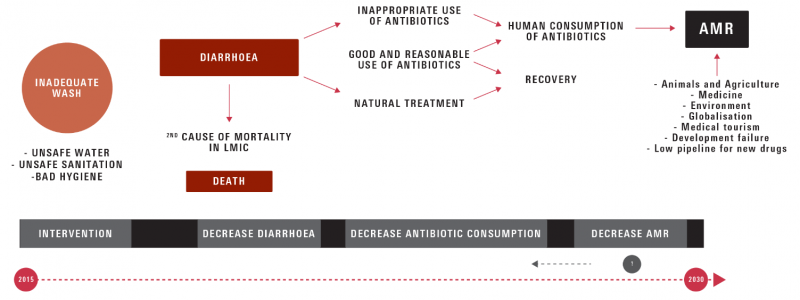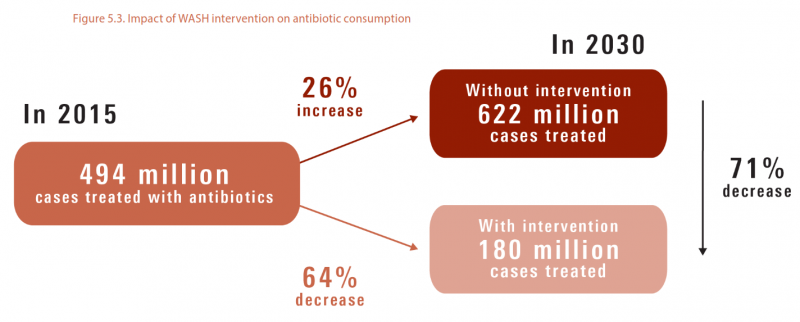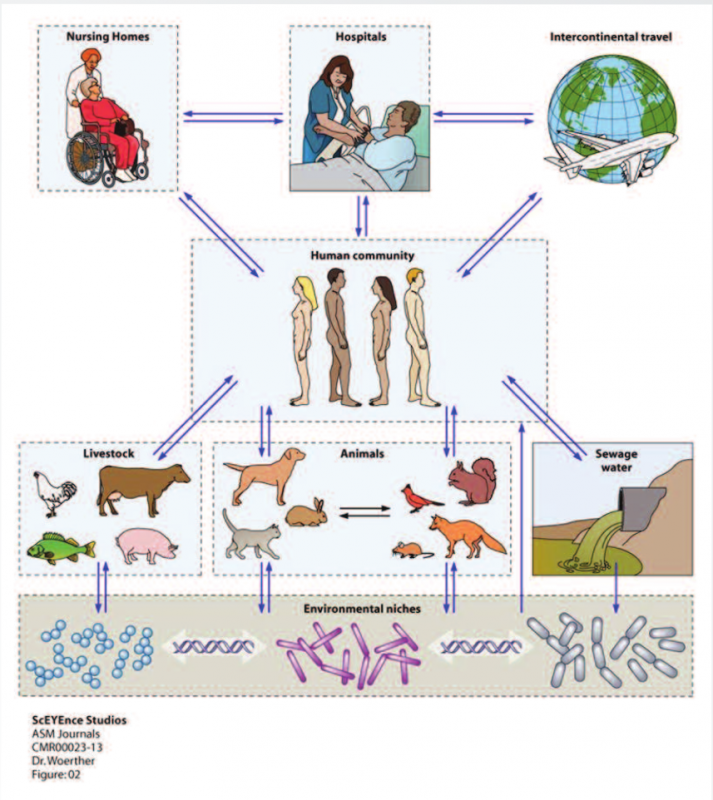- Health and hygiene, schools and other non-household settings
- Health issues and connections with sanitation
- Antibiotics resistance, micro-pollutants, chemical pollution
- SIMPLY STATED: The world thinks diarrhoea can be solved by taking antibiotics. How did we get this so wrong?
SIMPLY STATED: The world thinks diarrhoea can be solved by taking antibiotics. How did we get this so wrong?
14.1k views
- Elisabeth
-
- User is blocked
- Freelance consultant since 2012
Less- Posts: 3372
- Karma: 54
- Likes received: 932
Re: Reply: SIMPLY STATED: The world thinks diarrhoea can be solved by taking antibiotics. How did we get this s o wrong?
Thanks for the reminder of the first post with those publications. Since you are an expert on this topic, it is probably a lot faster for you than it would be for Marijn and myself to pick out the 1-3 publications that have the most "standing", are available online (not behind a paywall) and somewhat understandable for the layperson and which would back up those points that Marijn had made above, which we could add to the Wikipedia article under "prevention":
this then led me to consider the question of how WASH actually helps. I came up with the following plausible ways:
1.) Reduced episodes of water borne disease cause a decrease in the use antibiotics.
2.) Improved sanitation hygiene practices in healthcare facilities reduce the risk of hospital acquired resistant infections.
3.) Treatment of sewage (especially from high risk facilities like hospitals) reduces the spread of AMR bacteria, since the survival of AMR pathogens in a good treatment process is relatively low.
4.) Treatment of (hospital) wastewater could lower the levels of antibiotics that leak into the environment, thus lower the chance of pathogens acquiring resistance. (Is this really feasible with robust, low-tech approaches?)
Although regarding Point 3 we might have to change that one, as Kris also pointed out. Not all forms of treatment would reduce the spread of AMR bacteria. The second reference mentioned in Arno's first post said that:
The published information about water and sewage decontamination procedures with respect to antibiotic resistance remains extremely scarce, and it is urgent to design actions to fill this critical gap.
Another thing worth keeping in mind about this Wikipedia article: as the article on antimicrobial resistance falls under the WikiProject Medicine, the requirements for the sources to be cited are higher than for normal Wikipedia articles. This is explained here: en.wikipedia.org/wiki/Wikipedia:Identify...e_sources_(medicine)
E.g. a journal article about a specific case or a small study is not good enough. Best are review articles or publications by reputable organizations like WHO. Books also count.
Please help us to quickly zoom in and curate and then to add importance pieces of information to the Wikipedia article, together with the right references. It is our opportunity to make health professionals and the general public aware of the potential that improved sanitation could play to reduce AMR.
Regards,
Elisabeth
Freelance consultant on environmental and climate projects
Please Log in to join the conversation.
You need to login to replyRe: Reply: SIMPLY STATED: The world thinks diarrhoea can be solved by taking antibiotics. How did we get this s o wrong?
re your question about literature do take a look at the start of this thread (if you haven't already).
forum.susana.org/254-micro-pollutants-ph...-this-so-wrong#20506
The topic is also coming up for the first time at the Stockholm World Water Week programme.worldwaterweek.org/event/6883-...rs-impacts-solutions and subject of a public meeting in September at Sida in Stockholm www.sida.se/Svenska/aktuellt-och-press/d...-the-silent-tsunami/ with Otto Cars, founder of React. www.reactgroup.org/
Regards
Stockholm Environment Institute
This email address is being protected from spambots. You need JavaScript enabled to view it.
www.sei.org
www.ecosanres.org
Please Log in to join the conversation.
You need to login to replyRe: Reply: SIMPLY STATED: The world thinks diarrhoea can be solved by taking antibiotics. How did we get this s o wrong?
Very interesting. I think the health sector needs to change their approach in how they treat diseases like cholera, diarrhoea and focus not only on the reduction of over the counter antibiotics but also on preventative measures that are anchored in WASH related faecal-oral transmission e.g. toilets, treatment plants etc. The antobiotics that are also provided in many developing countries are not of high quality
Just recently in Kenya (a month ago), we had a cholera outbreak in Nairobi primarily caused due to poor sanitation.
www.nation.co.ke/counties/nairobi/Choler...30-1s8o3a/index.html
The focus should be on prevention. If there are antibiotics to be taken, they should be safe and effective and the quality has to be assured.
Its a tough issue as many stakeholders are involved. Would be interested to hear other examples from other countries.
Best regards,
Doreen
GIZ Sustainable Sanitation Programme
Policy Advisor in Bonn, Germany
Deutsche Gesellschaft für Internationale Zusammenarbeit (GIZ) GmbH
E This email address is being protected from spambots. You need JavaScript enabled to view it.
Please Log in to join the conversation.
You need to login to replyRe: Reply: SIMPLY STATED: The world thinks diarrhoea can be solved by taking antibiotics. How did we get this s o wrong?
Marijn Zandee wrote: 3.) Treatment of sewage (especially from high risk facilities like hospitals) reduces the spread of AMR bacteria, since the survival of AMR pathogens in a good treatment process is relatively low.
4.) Treatment of (hospital) wastewater could lower the levels of antibiotics that leak into the environment, thus lower the chance of pathogens acquiring resistance. (Is this really feasible with robust, low-tech approaches?)
This depends a bit on the type of treatment as typical aerobic waste-water treatment processes seem to have little or even slightly negative effect on the spread of antibiotic resistance harbouring bacteria (not necessarily the original pathogens as these gene sequences have a nasty habit of switching between species as they usually also contain other for bacteria useful functions).
I looked quite deeply into the topic back when I was discussing it here: forum.susana.org/254-micro-pollutants-ph...age-and-water-supply
but am now not so sure any more about the details
Please Log in to join the conversation.
You need to login to replyRe: Reply: SIMPLY STATED: The world thinks diarrhoea can be solved by taking antibiotics. How did we get this s o wrong?
The wiki article does seem to have been written mainly by medical experts (and with a focus on Europe and the USA). I think editing so that the role that WASH can play in prevention would be a good idea. This then led me to consider the question of how wash actually helps. I came up with the following plausible ways:
1.) Reduced episodes of water borne disease cause a decrease in the use antibiotics.
2.) Improved sanitation hygiene practices in healthcare facilities reduce the risk of hospital acquired resistant infections.
3.) Treatment of sewage (especially from high risk facilities like hospitals) reduces the spread of AMR bacteria, since the survival of AMR pathogens in a good treatment process is relatively low.
4.) Treatment of (hospital) wastewater could lower the levels of antibiotics that leak into the environment, thus lower the chance of pathogens acquiring resistance. (Is this really feasible with robust, low-tech approaches?)
I guess the questions now are:
Which ways in which WASH can help did I miss?
Do we have any literature on which of the pathway - intervention combinations above are actually serious issues?
Regards
Marijn
E: This email address is being protected from spambots. You need JavaScript enabled to view it.
Please Log in to join the conversation.
You need to login to reply- Elisabeth
-
- User is blocked
- Freelance consultant since 2012
Less- Posts: 3372
- Karma: 54
- Likes received: 932
Re: Reply: SIMPLY STATED: The world thinks diarrhoea can be solved by taking antibiotics. How did we get this s o wrong?
I just had a look at it, see here: en.wikipedia.org/wiki/Antimicrobial_resistance
Do you think the article is good like this? I am not an expert but I saw that untreated wastewater is mentioned under causes but not under the section of "prevention". I think here we could insert some useful content (with references). The word sanitation is only mentioned once, but the word wastewater and wastewater treatment (which is part of sanitation) does get some coverage in the article.
What do you think? Remember Wikipedia is one of the first places that journalists and laypersons turn to when they want to look something up and learn.
Regards,
Elisabeth
Freelance consultant on environmental and climate projects
Please Log in to join the conversation.
You need to login to replyRe: Reply: SIMPLY STATED: The world thinks diarrhoea can be solved by taking antibiotics. How did we get this s o wrong?
There is activity out there. Question is whether the connection to sanitation or lack of it is being taken seriously.
The Re-Act programme www.reactgroup.org/antibiotic-resistance/ is mapping national programmes on antimicrobial resistance. Its founder Otto Cars since March is a designated expert to the UN Interagency Coordination Group (IGC) on AMR. Here is the list of people/organisations sitting on the IGC-AMR: www.un.org/sg/en/content/sg/personnel-ap...microbial-resistance
Then there is the EU-based joint programme on AMR www.jpiamr.eu/ which finances research. Projects have been funded since 2015. Deadline for the fifth call for proposals was July 4, 2017. The program has a number of strategic working groups. www.jpiamr.eu/activities/strategic-working-groups/ It has produced a Strategic Research Agenda www.jpiamr.eu/document-library/strategicresearchagenda/ and there are 6 priority topics www.jpiamr.eu/wp-content/uploads/2014/04...topic_JPIAMR_DEF.pdf The topics surveillance, transmission, environment and intervention all could mention sanitation and hygiene practices - but they don't. And I haven't found the word sanitation on the entire website other than an announcement from the Nordic ministers in Sept of 2015 originally found here www.norden.org/en/nordic-council-of-mini...e-health-perspective
SuSanA has therefore an important job of lobbying the JPIAMR to ensure they extend the scope to include the risks surrounding inadequate and non-existent sanitation systems and poor hygiene practices.
Stockholm Environment Institute
This email address is being protected from spambots. You need JavaScript enabled to view it.
www.sei.org
www.ecosanres.org
Please Log in to join the conversation.
You need to login to replyRe: Reply: SIMPLY STATED: The world thinks diarrhoea can be solved by taking antibiotics. How did we get this s o wrong?
Part of what we see is the flip-side of the otherwise positive development of cheap generic drugs. It will not be a surprise to those working in the developing world, but to provide some insight. In Nepal, ciprofloxacin and metronidazole are available over the counter for something like 1 US$ for a strip of 10 tablets. You don't need any sort of prescription to get these. The result, if you have a bad stomach, people here will advise you to take one or two "Metros", Needless to say that this is terrible from an Antimicrobial Resistance (AMR) perspective.
For governments, obviously, the solution to flood the country with cheap antibiotics is much easier that to spend 10-15 years on making sanitation work.
One thing that I see as positive is that the WHO is in the process of reviving their WASH (and wider waste management) department. Though I think it it still a bit of an outpost within WHO. Their WASH page is worth looking at: www.who.int/water_sanitation_health/facilities/en/ . For now their focus seems to be on improving WASH in healthcare facilities. They are off course a potential source of AMR. The waste water is likely to contain elevated levels of antibiotics (from human urine) which leach into the environment. From my perspective, the bigger problem is that in hospitals you will find a concentration of patients with AMR gastrointestinal illness. The waste water of such facilities is potentially teeming with AMR bacteria.
For Susana, I think a noble task could be to find out which organizations are seriously working on AMR (including WHO), and to try and build bridges between them and the sanitation sector.
Regards
Marijn
E: This email address is being protected from spambots. You need JavaScript enabled to view it.
Please Log in to join the conversation.
You need to login to reply- Elisabeth
-
- User is blocked
- Freelance consultant since 2012
Less- Posts: 3372
- Karma: 54
- Likes received: 932
Re: Reply: SIMPLY STATED: The world thinks diarrhoea can be solved by taking antibiotics. How did we get this s o wrong?
Thanks for pointing out these sobering facts about India! If I was a healthcare provider in India I would be tearing my hair out wondering what else could be done to get the messages out and to achieve lasting behavior change; I'm referring to your statement:
There is gross mismanagement of childhood diarrhoea in India, both within the home (where up to 4 in 10 mothers withhold fluids, thereby tragically increasing risk of death through dehydration) ...
You also said:
The discussion forums HIFA (global health) and CHIFA (global child health) look forward to possibility of collaborating with SuSanA to address this issue.
I wonder how much impact on the ground our three discussion forums really have. I know SuSanA would not reach down to the level of households, and I wonder if we're doing enough to connect our messages to behavior change communications work (and indeed to the public health sector).
I guess our SuSanA partners and BMGF grantees have these projects working on behaviour change (filtering our SuSanA project database by behaviour change as a topic):
www.susana.org/en/resources/projects?vbl...&vbl_21%5B608%5D=608
Would be good to hear more from those and see how we can support them. If anyone is interested in this see also the forum sub-category on behaviour change here:
forum.susana.org/71-behaviour-change-and-user-psychology-issues
We also have a working group for it where people can subscribe to - it's our working group 13: forum.susana.org/274-wg-13-behaviour-change
Regards,
Elisabeth
Freelance consultant on environmental and climate projects
Please Log in to join the conversation.
You need to login to replyRe: Reply: SIMPLY STATED: The world thinks diarrhoea can be solved by taking antibiotics. How did we get this s o wrong?
Yes indeed. There is gross mismanagement of childhood diarrhoea in India, both within the home (where up to 4 in 10 mothers withhold fluids, thereby tragically increasing risk of death through dehydration) and by healthcare workers (both in the allopathic and ayurvedic traditions), where most cases are inappropriately treated with antibiotics and few are treated according to WHO guidelines with ORS and zinc.
[1] www.hifa.org/about-hifa/why-hifa-needed [2] bmcinfectdis.biomedcentral.com/articles/10.1186/1471-2334-11-32
The discussion forums HIFA (global health) and CHIFA (global child health) look forward to possibility of collaborating with SuSanA to address this issue.
Best wishes, Neil
Dr Neil Pakenham-Walsh MB,BS, DCH, DRCOG HIFA Coordinator Co-director, Global Healthcare Information Network Chair, Dgroups Foundation ( www.dgroups.info ) Corner House, Market St Charlbury, Oxfordshire OX7 3PN, UK
E: This email address is being protected from spambots. You need JavaScript enabled to view it. T: +44 (0)1608 811899 W: <www.hifa.org/>www.hifa.org Tw: @HIFA_org FB: HIFAdotORG
[]
With thanks to our financial contributors for 2017: British Medical Association (main funder), Africa Health, Afro-European Medical & Research Network, Association for Good Clinical Practice in Nigeria, Canadian Society for International Health, Chartered Society of Physiotherapy, Child Family Health International, Commonwealth Nurses & Midwives Federation, Council of International Neonatal Nurses, ecancer, Equal Health (Physicians for Haiti), EUCLID School of Global Health and Bioethics, Foundation for Mother and Child Health, Global Health Media Project, Haiti Nursing Foundation, International Child Health Group, International Society for Social Paediatrics and Child Health, Joanna Briggs Institute, Kaicombey Foundation, Knowledge Transfer Africa Ltd, LiveWell Initiative, Liverpool School of Tropical Medicine, Medic to Medic, Medic Mobile, Network for Information and Digital Access, One World Medical Network, Palliative Drugs, Pan African Medical Journal, Special Programme for Research and Training in Tropical Diseases (TDR), The Lancet, The Mother and Child Health and Education Trust, Virtual Development, Wiki Project Med Foundation, World Health Organization, Your MD, Zambia UK Health Workforce Alliance.
Please Log in to join the conversation.
You need to login to reply- Elisabeth
-
- User is blocked
- Freelance consultant since 2012
Less- Posts: 3372
- Karma: 54
- Likes received: 932
Re: SIMPLY STATED: The world thinks diarrhoea can be solved by taking antibiotics. How did we get this so wrong?
This is all very sobering and scary indeed. One would hope that the medical or public health community would start to scale down antibiotics use and rather push for more WASH in developing countries. - Do you see any such developments?
What does all this mean for us as sanitation experts? Is there anything that we should do differently or on top of our normal work with regards to promoting the importance of WASH?
We've been pushing for more funding for WASH for so long... Do you think this additional factor (antimicrobial resistance (AMR)) will make a difference? I hope so, but am not sure.
India seems to be at the forefront of both: high prevalence of open defecation and untreated wastewater in rivers; and high over-use of antibiotics. A very bad combination!?
Regards,
Elisabeth
Freelance consultant on environmental and climate projects
Please Log in to join the conversation.
You need to login to replySIMPLY STATED: The world thinks diarrhoea can be solved by taking antibiotics. How did we get this so wrong?
While FSM4 www.fsm4.susana.org/ is ongoing in Chennai and the focus is on India, here are some sobering findings regarding the increase in antimicrobial resistance caused by overzealous use of antibiotics to combat diarrhoeal and other infections.
THE IMPACT OF WATER AND SANITATION ON DIARRHOEAL DISEASE BURDEN AND OVER-CONSUMPTION OF ANTIBIOTICS
Pablo Araya, Julia Hug, Genevieve Joy, Felicia Oschmann, Susana Rubinstein
London School of Economics and Political Science. 2016
amr-review.org/sites/default/files/LSE%20AMR%20Capstone.pdf
Infectious disease control through improved water, sanitation and hygiene (WASH) infrastructure needs to be placed at the centre of the antimicrobial resistance (AMR) agenda. The spread of infectious diseases caused by inadequate WASH standards is a major driver of antibiotic demand in developing countries. Growing usage of antibiotics together with persistent infectious disease levels have led to a dangerous cycle in which reliance on antimicrobials increases while the efficacy of drugs diminishes.
The 15 yr project to reduce use of antibiotics and instead increase WASH capacities to combat diarrhoea.
• What are the costs of providing universal, safe access to water and sanitation for the countries?
• How much would access to WASH reduce diarrhoeal diseases in these countries?
• How would the reduction of diarrhoeal disease likely impact the overuse of antibiotics?
Possible impact by 2030
__________________________________________
THE ROLE OF SANITATION IN THE DEVELOPMENT AND SPREAD OF ANTIMICROBIAL RESISTANCE
by ANTOINE ANDREMONT & TIMOTHY R WALSH. 2015
www.globalhealthdynamics.co.uk/wp-conten..._Andremont-Walsh.pdf
Of greatest concern is the production and gross environmental contamination with fluoroquinolones (e.g. ciprofloxacin), once considered the perfect antibiotic. Studies have shown therapeutic levels of ciprofloxacin in Indian rivers and if the elegant studies of Beaber and colleagues are extrapolated to South Asia, this would indicate a colossal level of gene transfer happening in and between bacteria in this part of the world. This antibiotic load or pressure is further exacerbated by the levels of poorly degraded antibiotics contained in peoples normal flora that either enter sewerage treatment plants or worryingly, through open defecation. The published information about water and sewage decontamination procedures with respect to antibiotic resistance remains extremely scarce, and it is urgent to design actions to fill this critical gap. Specifically, the activities should provide a meta-analysis of current national and international activities concerning the situation of waste disposal including the availability of suitably clean potable water, and its relation with the spread of antibiotic resistant organism among humans and animals. Related to this meta-analysis, is information on antimicrobial resistance and whether community carried AR/community acquired infections is a key concern.
AMR vectors diagram
_________________________________________________________________
ANTIBIOTIC RESISTANCE IN INDIA: DRIVERS AND OPPORTUNITIES FOR ACTION
Ramanan Laxminarayan, Ranjit Roy Chaudhury
March 2, 2016
dx.doi.org/10.1371/journal.pmed.1001974
journals.plos.org/plosmedicine/article?i...journal.pmed.1001974
Environmental antibiotic pollution encourages the transfer of resistance genes to human commensal and pathogenic bacteria. In particular, waste water treatment plants serving antibiotic manufacturing facilities have been implicated in the transfer of resistance genes into human microbiota and pose a serious threat to antibiotic effectiveness given the size of India’s pharmaceutical sector. There are no regulations governing the discharge of antimicrobial waste into the environment, and these are needed. Currently, India does not have regulatory provisions for the use of antimicrobials in cattle, chickens, and pigs raised for domestic consumption. Recent studies in various regions of India have discovered antimicrobial residues in food animal products (such as chicken meat and milk) [25], indicating that antibiotic use in food animal production is widespread. There are no standards for tolerance of antibiotic residues in poultry, although such standards do exist for seafood.
Increased usage of antibiotics in India
_________________________________________________________________
FOREIGN TRAVEL IS A MAJOR RISK FACTOR FOR COLONIZATION WITH ESCHERICHIA COLI PRODUCING CTX-M-TYPE EXTENDED-SPECTRUM -LACTAMASES: A PROSPECTIVE STUDY WITH SWEDISH VOLUNTEERS by Thomas Tängdén, Otto Cars, Åsa Melhus and Elisabeth Löwdin. ANTIMICROBIAL AGENTS AND CHEMOTHERAPY, Sept. 2010, p. 3564–3568.
India has highest risk for foreign travelers re being infected by AMR bacteria. Prevalence of "extended-spectrum beta-lactamase" (ESBL)-producing Enterobacteriaceae is increasing globally, and community-onset infections with ESBL-producing Escherichia coli are a major clinical concern in many countries. Considering the high rate of acquisition of ESBL-producing isolates and the extent of international travel in many countries, it is obvious that global efforts are needed to meet the emergence and spread of CTX-M enzymes and other antimicrobial resistances. Further international cooperation on rational antibiotic use and control is urgently needed.
A small study with great implications.
_______________________________________________________________
2015 WHO EMERGING WASH ISSUE AND NEED FOR RISK EXPOSURE ASSESSMENT
apps.who.int/iris/bitstream/10665/204948...SH_14.7_eng.pdf?ua=1
Concern is antibiotics and antimicrobial agents, their metabolites, AMR bacteria and AMR genes and enzymes (plasmids) andhuman excreta-related environmental exposures. Water and sanitation are the first lines of defence.
___________________________________
MAY 2016 UK REVIEW ON AMR
amr-review.org/sites/default/files/16052...per_with%20cover.pdf
predicts 10 million will die per yr due to AMR by 2050. Rates are 700.000 per yr now.
______________________________________
GLOBAL MAPPING OF ANTIBIOTIC RESISTANCE
resistancemap.cddep.org/index.php
Stockholm Environment Institute
This email address is being protected from spambots. You need JavaScript enabled to view it.
www.sei.org
www.ecosanres.org
Attachments:
-
 15yrprojec...ions.png
(Filesize: 155KB)
15yrprojec...ions.png
(Filesize: 155KB)
-
 impactofWA...cuse.png
(Filesize: 140KB)
impactofWA...cuse.png
(Filesize: 140KB)
-
 epidemiolo...rAMR.png
(Filesize: 720KB)
epidemiolo...rAMR.png
(Filesize: 720KB)
-
trendsinus...g001.PNG (Filesize: 232KB)
-
 AMRriskSwe...tudy.png
(Filesize: 238KB)
AMRriskSwe...tudy.png
(Filesize: 238KB)
Please Log in to join the conversation.
You need to login to reply- Health and hygiene, schools and other non-household settings
- Health issues and connections with sanitation
- Antibiotics resistance, micro-pollutants, chemical pollution
- SIMPLY STATED: The world thinks diarrhoea can be solved by taking antibiotics. How did we get this so wrong?








